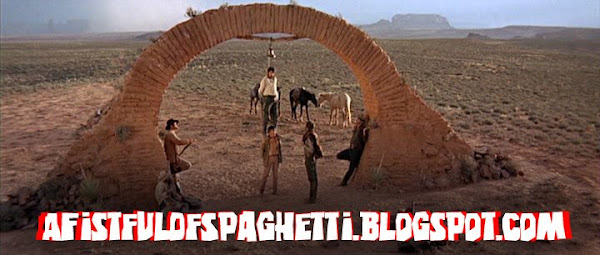The director's famed 'spaghetti westerns' will be on display in the retrospective 'Once Upon a Time.'
By Sari Heifetz-Stricke, Special to the Los Angeles Times
February 17, 2012
The best way to find a good guy in the westerns of directorSergio Leone is to look for a worse guy. The Italian director's penchant for blurring of the lines between heroes and villains stood in stark contrast with the clear distinctions found in traditional Hollywood westerns and helped modernize and revitalize the genre, two facts readily apparent "Once Upon a Time: The Films of Sergio Leone" at the American Cinematheque beginning Friday.
Born in Rome in 1929, Leone was the son of a film director and a silent film actress. After a brief stint in law school, the young Sergio promptly joined the family business in 1948, working as an assistant to the legendary Italian directorVittorio de Sica on his neorealist classic "Bicycle Thieves" (1948). Leone went on to work on several "sword-and-sandal" epics including "Ben-Hur," but his big break came in 1959 on the set of "The Last Days of Pompeii" when the film's director became ill on the first day of shooting and Leone took over and began developing a style that became so recognizable in his western films.
Leone adapted Akira Kurosawa's 1961 samurai film "Yojimbo" into "A Fistful of Dollars" (1964), moving the story from medieval Japan to the American Southwest and replacing Kurosawa's wandering samurai with a nameless, gun-slinging drifter. The film helped launch the career of one of Hollywood's most enduring western icons, Clint Eastwood.
As a mysterious outlaw who came to be known as "The Man With No Name," Eastwood embodied the director's combination of extreme violence and ambiguous morality while allowing for brief moments of compassion for innocents amid a quick-handed bloodbath. Eastwood returned as a bounty hunter in Leone's sequel "For a Few Dollars More"(1965) and "The Good, the Bad and the Ugly" (1966), and attendees to the upcoming retrospective will have another chance to see the classic trilogy in its full widescreen glory.
"The American Cinematheque presented its first Sergio Leone retrospective in 2003," said the Cinematheque's series programmer, Gwen Deglise. "Every few years we bring back the films of one of the great, larger-than-life personalities of cinema."
Leone's films and other low-budget westerns shot in Europe by the Italian film industry were quickly coined "spaghetti westerns," a term initially meant to deride the low-budget sub-genre, but the name was quickly embraced by fans. These films were noted for their harsh and unsentimental depiction of the American West, demythologizing the genre's old-fashioned depictions of morality and its characterization of brutal gun violence in the name of justice as redemptive.
The retrospective also features Leone's revenge tale "Once Upon a Time in the West" (1968), which cast perennial good-guy Henry Fonda against type as a sadistic killer attempting to evade retribution at the hand of a young Charles Bronson. Also being shown is the director's lesser-known "Duck, You Sucker" (1971), which was also known by the title "Fistful of Dynamite" and stars Rod Steiger andJames Coburn as a pair of outlaws who are pulled into the Mexican Revolution.
In addition to their ironic and even nihilistic posture, Leone's films were known for their innovative cinematic techniques, including dramatic wide-angle shots and extreme close-ups, the use of slow motion paired with violence and the important role of music in the hands of Leone's longtime collaborator, composer Ennio Morricone. Morricone's unmistakable scores departed from the elaborate orchestral compositions of conventional Hollywood westerns, adding sound effects, human voices and electric guitar to punctuate the films' dark humor and operatic violence.
In terms of rising to prominence in the wake of working with Leone, Deglise placed the composer on equal footing with Eastwood. "[Morricone is] one of the most original, eclectically fluid soundtrack composers of the second half of the 20th century," she said.
Leone's flamboyant style and charismatic criminals leave a long legacy in their wake, and dozens of filmmakers have cited his films as an influence, including Eastwood, Quentin Tarantino, Martin Scorsese, John Carpenter, Robert Rodriguez and George Lucas.
"Each time [the Cinematheque presents a retrospective], a new, young audience discovers the iconic cinema of Sergio Leone," Deglise said. "This experience is made for the big screen."
'Once Upon a Time: The Films of Sergio Leone' at American Cinematheque
Where: Egyptian Theatre, 6712 Hollywood Blvd., Hollywood, and Aero Theatre, 1328 Montana Ave., Santa Monica
When: Fri. and Sat., Thu. and Feb. 24
Fri., 7:30 p.m., Aero: "A Fistful of Dollars" (1964) and "For a Few Dollars More" (1965)
Sat., 7:30 p.m., Aero: "The Good, the Bad and the Ugly" (1966)
Feb. 23, 7:30 p.m., Egyptian: "Duck, You Sucker" (1971)
Feb. 24, 7:30 p.m., Egyptian: "Once Upon a Time in the West" (1968)
Price: $7 to $11
Info: (323) 466-FILM; americancinematheque.com
calendar@latimes.com
ShareTwitt
Friday, February 17, 2012
Subscribe to:
Posts (Atom)



